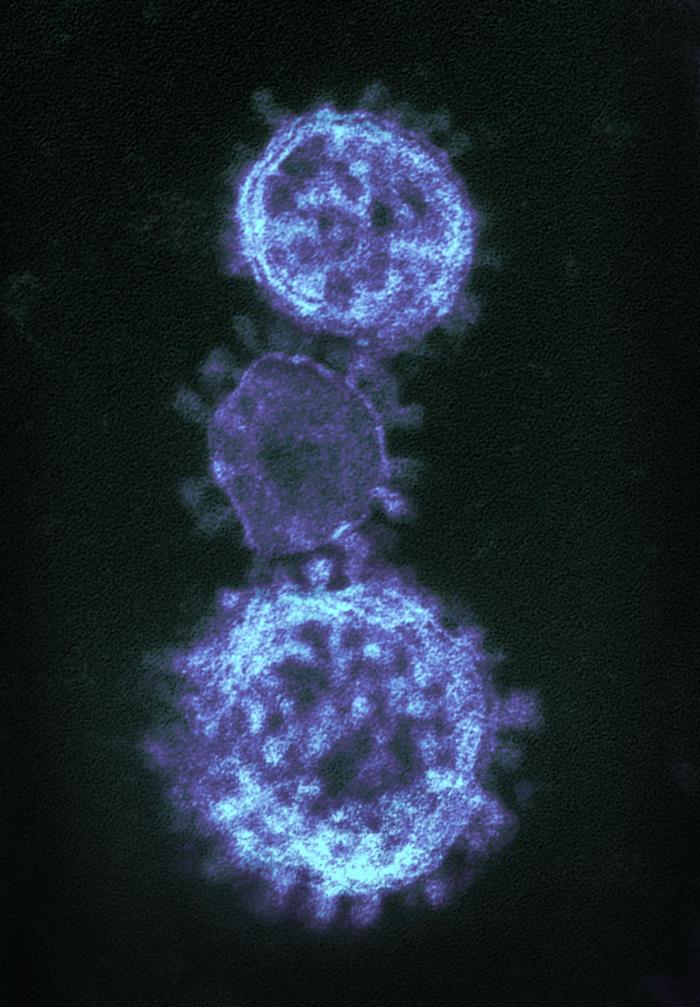NewsDesk @bactiman63
The National IHR Focal Point of Qatar has reported two confirmed cases of Middle East respiratory syndrome coronavirus (MERS-CoV) from late March to early April, according to the World Health Organization (WHO) this week.

Image/National Institute of Allergy and Infectious Diseases (NIAID)
Both cases had frequent close contact with dromedary camels and consumption of their raw milk in the 14 days prior to the onset of symptoms. One of the cases died.
WHO provided the following details on the cases:
The first case was a 50-year-old male, working and living in a camel farm in Al Shaniya Doha. On 16 March, the case presented to the emergency department at Hamad Medical Corporations in Doha with a history of productive cough for one-week, high grade fever and shortness of breath. The patient was admitted to the medical ward on 17 March, and on 18 March due to a deterioration of the health status was transferred to the Intensive Care Unit (ICU). A nasopharyngeal swab was collected and tested positive for MERS-CoV by reverse transcription polymecercarase chain reaction (RT-PCR) (upE and Orf1a genes) at the virology laboratory, Hamad Medical Corporation on 19 March. The patient has no comorbidities, and reported frequent close contact with dromedary camels and consumption of their raw milk in the 14 days prior to the onset of symptoms. No recent travel history was reported for the case or any of the case’s contacts. None of the identified four contacts reported symptoms of the disease and all tested MERS-CoV negative. No further information on the health status of the case is available at the time of writing.
The second case was an 85-year-old male, dromedary camel owner living in Doha. On 18 March, the patient presented to the emergency department at Hamad Medical Corporations with a history of productive cough for one-week, high grade fever and shortness of breath, and was admitted to the medical ward on the same day, during which the clinical status of the patient deteriorated. A nasopharyngeal swab was collected and tested positive for MERS-CoV by RT-PCR (upE and ORF1a genes) at the Hamad Medical Corporation virology laboratory on 19 March. On 22 March, the patient was intubated and transferred to the ICU where he died on 14 April. The patient had comorbidities including diabetes mellitus, hypertension, and hypercholesterolemia. The epidemiological investigation revealed that 14 days prior to admission to the hospital the case had travelled with his camel to Saudi Arabia, where he visited other dromedary camel owners. The case also reported frequent contact with dromedary camels, as well as consuming raw milk from dromedary camels in Saudi Arabia.
The case initially presented to a health centre while he was in Saudi Arabia, with symptoms including vomiting, loss of appetite, fever, and chills. He was subsequently diagnosed with an acute urinary tract infection. The medical staff at the health center in Saudi Arabia referred him to a hospital, but he decided to return to Qatar immediately. Investigation of 12 household contacts and health care workers has been completed and all have tested negative for MERS-CoV . The IHR-NFP of Saudi Arabia has also been notified.
Before these notifications, the last MERS-CoV infection reported from Qatar was in February 2020. Since 2012, Qatar has reported a total of 28 human cases of MERS-CoV, and 7 deaths, including the two new reported cases.
- UK officials report two additional monkeypox cases in London, Unrelated to recent identified case
- Typhoid vaccine, SKYTyphoid, licensed for export by Korea
- Norovirus illnesses linked to Seattle IHOP
- Michigan reports 3 red fox kits died from highly pathogenic avian influenza
- South Africa reports fatal imported Lassa fever case, 1st case since 2007
- North Korea COVID-19 update: More than 350,000 people got ‘fever’ since late April, 6 deaths reported
- Dengue fever: More than 1,700 cases reported in the Honduras capital
- North Korea state media reports on first ‘official’ news of COVID-19 in country

